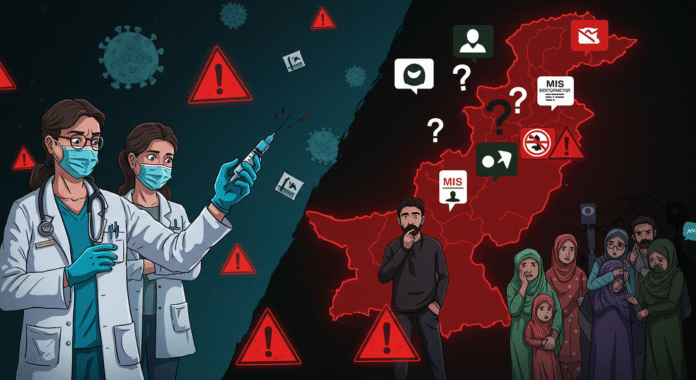Vaccine hesitancy in Pakistan does not only capture the delay and refusal to immunize. Sometimes, there are misconceptions about vaccines and the vaccine hesitancy and refusal. It can simply stem from the desire to postpone the vaccine till later.
Globally, trust, culture, and misinformation can contribute to vaccine hesitancy. In the case of Pakistan, there are specific historical and religious factors, coupled with a considerable deficiency of trust towards the authorities.
Given the importance of immunization to defend children from vaccine preventable diseases, Pakistan needs to concert its efforts to reduce vaccine hesitancy and denial within the population.
Vaccine Hesitancy in Pakistan: Keeping Track of Changes 2024–2025
The scale of the problem can be gauged from the last few virus elimination campaigns. In Karachi alone, 41,000 families did not bring their children to receive polio drops. Almost 60,000 households across the country were visited by vaccinators, only to be refused entry, in the first week of the 2025 campaign.
This situation is alarming as Pakistan is one of only two countries in the world where polio is endemic. With every refusal, the likelihood of the virus being transmitted is greater, on a local and international level as well.
Vaccine Hesitancy in Pakistan: Myths and Lies
The polio vaccine is said by some as to be a way to sterilize people and is also said to be a part of a conspiracy coming from abroad. Immune reactions to the drops, which are known and documented to be harmless, are still feared by a number of people.
Religion, Culture, and Vaccine Hesitancy in Pakistan
In still other circles, the religious or cultural narratives have an anti-vaccination disposition. Some of the family members regard it as a matter of faith, whereas, others have fallen prey to religiously motivated disinformation campaigns.
Social Media and Vaccine Hesitancy in Pakistan
Misinformation is rampant on platforms such as WhatsApp and Facebook. One viral WhatsApp message or erroneous video can waste a couple of months of sustained efforts in advocacy campaigns.
Vaccine Hesitancy in Pakistan: Lack of Trust in Government
Owing to the dysfunctional political environment and years of substandard healthcare services, belief in the authorities has eroded. Entire families tend to regard the public officials or the foreign aid workers as dispassionate concerning their plight.
Examining the Connection Between Public Health and Vaccine Hesitancy in Pakistan
There have been great efforts put forth in the fight against polio and what continues to remain polio is the virus itself. Virus and polio have only been found in the sewage sample in Pakistan confirming their prevalence in the region.
Because of stop gap measures, many youngsters have to suffer from the persistent and worsening diphtheria and measles, as well as other potentially avoidable illnesses. Their emergence only weakens an already strained network of healthcare.
Lack of Knowledge about the Impact of Vaccine Hesitancy in Pakistan
Parents are confronted directly by health personnel and then educated on the usefulness of the vaccines in their native tongue while attending to their inquiries.
What is the Impact of Vaccine Hesitancy in Pakistan?
Faith based efforts are put forth by Imams and scholars to spread the positive word of vaccines as well as combat vaccine misinformation.
Targeting the Impact of Vaccine Hesitancy in Pakistan
Most of the time, the leaders of the teams are female health professionals. They, along with their units, visit the homes several times to ensure the children are being immunized. It is their doggedness which helps in persuading vaccine hesitant parents.
Social Media Claim Verification to Combat Vaccine Hesitancy in Pakistan
In more detail, the government and nonprofit organizations are actively developing disinformation countermeasures on the Internet.
There other, more encouraging, examples about vaccine hesitancy in Pakistan. In Khyber Pakhtunkhwa, local elders collaborated with health personnel to provide access to vaccines in some of the previously vaccine-resistant villages.
In urban Karachi, community leaders and mothers’ groups have done significant work to shift the vaccine discourse. These examples teach the lesson that with enough trust and information, people can overcome their doubts.
In Pakistan, what lies ahead for the vaccine and vaccine hesitancy is defined by Vision 2030, which sets Pakistan’s health targets for the coming years. The foremost is eradicating polio.
We have the polio vaccine, which is safe, effective, and freely available, so the question is not about our capacity. It is about the degree of knowledge and trust we can generate in the population to ensure that every single child is protected. There is cautious optimism that with the continued collaboration of communities, leaders, and health workers, vaccine hesitancy will be greatly reduced and polio will be eliminated from Pakistan.
The Last Take Regarding Vaccine Hesitancy in Pakistan
People in Pakistan do not wish to vaccinate due to a variety of reasons. These reasons include irrational fears as well as a lack of trust in the sources of the vaccine and the administrators.
Though the challenge is real, there are certainly efforts being made to overcome it. Pakistan can protect its children and move towards a polio-free tomorrow by busting myths and exposing parents to the real worth of parental immunizations which, in turn, builds credibility.



